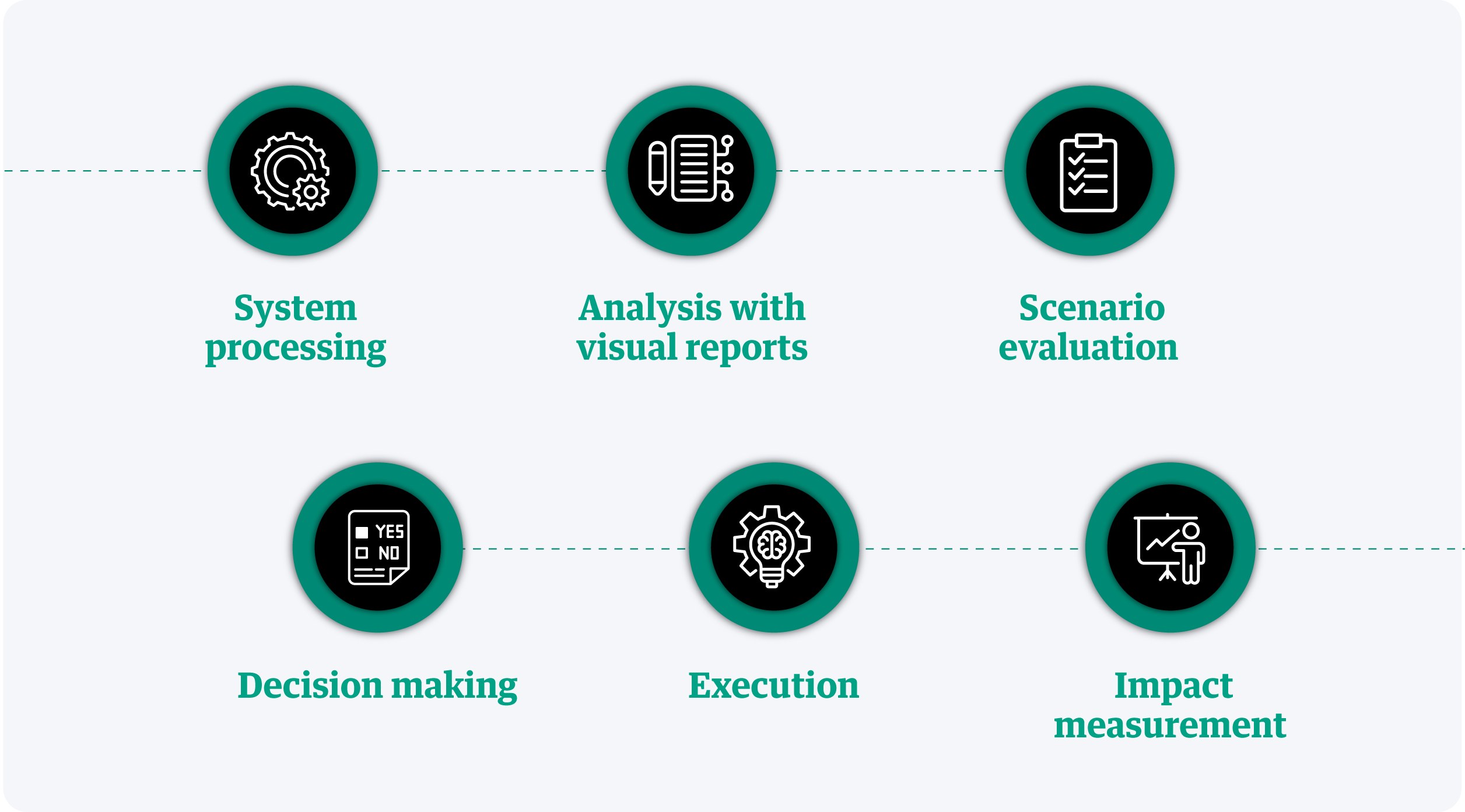To ensure informed decision-making, companies must anticipate, adapt, and remain current in both the market and the digital realm. Strategic systems are vital in this regard, as they help identify growth opportunities.
This article will explore the core aspects of strategic business systems, including their definition, operation, various types, and their significant impact on a company's capacity to not only survive but also flourish and evolve.
What are strategic systems?
Strategic business systems are vital, integrating processes and technologies to support executive and managerial decision-making. They gather, analyze, and present key data, allowing organizations to concentrate on long-term objectives.
These systems provide foresight beyond daily tasks, facilitating proactive planning and quick adaptation to market changes.
What benefits do strategic systems provide?
Strategic systems provide numerous advantages for organizations. Key benefits include:
1. Improve decision-making
Strategic systems offer current and dependable data, leading to more precise decision-making. This is accomplished through the analysis of vital information spanning various company departments, including sales, production, and finance.
By consolidating this data onto a single platform, it becomes easier to analyze and predict different scenarios before new strategies are implemented.
This empowers decision-makers with tools to identify trends, recognize potential risks, or uncover new avenues for growth, rather than relying on speculation or incomplete information.

2. Generate sustainable competitive advantages
Companies leverage strategic systems to gain a competitive edge by identifying market opportunities ahead of rivals.
These systems enable organizations to develop more effective and personalized strategies. This is achieved by analyzing data related to consumer behavior, market trends, and internal indicators, allowing them to cater to the specific needs of their potential customers.
Furthermore, strategic systems help businesses anticipate market shifts and react swiftly to changes.
For instance, a company that identifies an early drop in demand can quickly adjust its resources and campaigns, thereby minimizing a more significant impact.
3. Identify opportunities for growth or expansion

These systems employ an analytical and predictive approach to uncover new opportunities and markets. Through an analysis of sales and customer behavior, they can identify the products most likely to succeed in specific regions.
Furthermore, these systems aid in the development of financial and commercial scenarios before critical decisions are made.
This allows companies to evaluate the potential impact of expansions, alliances, or new product launches, thereby reducing errors and increasing the likelihood of success.
4. Increase efficiency through data analysis
Strategic systems are vital for business efficiency. They streamline operations by centralizing information and automating process analysis, freeing up time for strategic planning rather than routine tasks.
These systems provide real-time insights, such as alerts for process deviations or excessive departmental spending, enabling immediate corrective actions and resource optimization.
What are the key characteristics of a strategic system?

Strategic systems are distinguished from operational or administrative systems by several key elements. These are outlined below:
1. Focus on the long term
Strategic systems are crucial for forward-looking business decisions.
They enable leaders to analyze historical data, make projections, and identify trends to visualize medium and long-term scenarios.
This focus on developing a sustainable business model allows organizations to anticipate changes and achieve steady growth.
2. Predictive analytics capability
Strategic systems leverage artificial intelligence, statistical models, and machine learning to analyze vast amounts of data and forecast future scenarios.
This capability allows them to identify patterns and preemptively detect potential risks or crises.
For instance, a platform could foresee a drop in demand for specific products and notify managers before it negatively affects revenue.
This predictive analysis empowers companies to anticipate and proactively address potential issues.
3. Integration between different areas of the company

Strategic systems unify data from diverse departments like sales, operations, and human resources. This integration provides a holistic view of the business, facilitating better decision-making.
Such a comprehensive outlook fosters more cohesive and synchronized strategies, as each department gains insight into how its contributions impact the company's overarching performance.
4. Visibility of key organizational metrics
Strategic systems are vital for companies because they enable the establishment, monitoring, and analysis of Key Performance Indicators (KPIs). By aligning these KPIs with overarching company objectives, leaders gain a comprehensive understanding of their progress toward goals.
For instance, tracking indicators like strategic customer growth or profitability per business line empowers leaders to make necessary corrective decisions or to quickly capitalize on emerging opportunities.
5. Adaptability to change
Strategic systems require adaptability and flexibility to thrive in constantly evolving market conditions. This allows them to adjust to new priorities and needs, maintaining their value over time.
Unlike rigid systems, adaptable ones can incorporate new data sources or modify their analytical logic without interrupting operations.
This inherent flexibility strengthens an organization's resilience, ensuring technology remains a vital strategic asset.
To further clarify, a table detailing the distinctions between strategic and operational systems is provided below.
|
Feature |
Operating systems |
Strategic systems |
|
Focus |
Day-to-day tasks |
Long-term decision-making |
|
Primary users |
Personal operativo |
Senior management and area leaders |
|
Objective |
Functional efficiency |
Generate competitive advantage |
|
Type of data analyzed |
Current or immediate data |
Historical and projected data |
|
Impact level |
Internal processes |
Business address |
What are the main strategic systems in companies?

Strategic systems are designed with various approaches, depending on the specific area they aim to improve. Here are some of the most common systems employed by companies across different sizes and industries:
1. Customer relationship management (CRM) systems
A CRM is more than just a customer database; it's a vital tool that consolidates all pertinent information about prospects, buyers, and current customers.
This comprehensive view empowers various departments within an organization to make data-driven strategic decisions, enhance the customer experience, tailor offers, and cultivate stronger loyalty.
2. Enterprise resource planning (ERP) systems
Enterprise Resource Planning (ERP) systems integrate diverse business functions such as purchasing, inventory, production, and finance onto a single platform.
Proper implementation of an ERP system not only enhances operational efficiency but also provides a strategic overview of the organization's condition.
A well-executed ERP system enables the alignment of resources with corporate objectives and facilitates more effective budget management.
3. Business intelligence (BI) systems
Business Intelligence (BI) systems are vital for companies. They gather, process, and present data via dashboards and reports, enabling in-depth analysis.
These strategic systems transform information into crucial insights, offering leaders a clear view of effective strategies, areas needing improvement, and the organization's future path.
4. Supply Chain Management (SCM) System
Supply Chain Management (SCM) involves the strategic oversight of the entire process, from sourcing raw materials to delivering the finished product.
These systems leverage data analysis and automation to optimize inventory, strengthen supplier relationships, forecast demand, and reduce logistics costs.
An efficient Supply Chain Management (SCM) system enhances both customer experience and company profitability. It achieves this by facilitating data-driven decisions and significantly reducing the risk of stockouts.
Make every decision count: invest in strategic systems

Strategic systems are crucial for business advancement and growth.
Companies can make informed decisions, anticipate market fluctuations, and develop accurate strategies by utilizing platforms like CRM or ERP.
London Consulting Group's digital division offers solutions that merge technology, strategy, and business intelligence to drive business transformation.
We develop and implement custom platforms and advanced analytics systems, always aiming to design digital models that enhance decision-making and produce tangible results.
If your organization seeks sustainable, data-driven growth, integrating a strategic system with expert assistance can be transformative. Contact us for more details.


